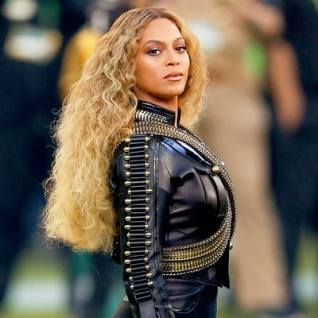Let’s Get in Formation: Beyoncé and Black Hair
 A reflection written by Women’s Center staff member, MJ Jalloh Jamboria
A reflection written by Women’s Center staff member, MJ Jalloh Jamboria
Beyoncé’s newest hit, “Formation” has been the topic of conversation everywhere. If you missed the video, here it is!
Since her Super Bowl performance on February 7th, Beyoncé has received mountains of praise and criticism for her performance and newest video. (Also, take a second to watch the Super Bowl performance here if you haven’t already. Ready? OK!)
While surfing Twitter during the Super Bowl performance (obviously not as Bey was singing), I came across a tweet that angered me to my very core. In efforts to find the original tweet, I came up empty handed, so instead I’ll summarize. The author of the tweet expressed anger at the hairstyle Beyoncé chose to rock for her Super Bowl performance, specifically the color and texture of her weave.

Credit: Getty Images
Their ire was grounded in the fact that Beyoncé’s weave wasn’t aligned with the pro-blackness and importance of self-identity portrayed within her video.
Trying to isolate my frustration with the tweet, I found myself asking (and later dissecting) the following questions:
- Why are people focusing on her hair style?
- Why is wavy, blonde hair considered anti-black and indicative of self-hate??
First of all, weaves are not always indicative of hatred of one’s own natural hair! Beyoncé, and black women everywhere, are entitled to having and wearing the hairstyles that express themselves or the person they choose to personify. Seemingly, the choice to wear her hair long, blonde and wavy (as opposed to in an afro, like her performers) was a PERSONAL CHOICE (or between herself and her stylist). It seemed as if the author of the tweet thought Beyonce’s lack of afro or other natural hairstyle was a rejection of blackness. The idea that Black women should stick to a limited number of styles to be considered beautiful or “black enough” is ridiculous! Second, long blonde hair does not belong to one racial or ethnic group.
At first, I was upset that people weren’t paying attention to the positive messages in her song, video and performance. For example, her section of the Super Bowl performance paid homage to Malcolm X, the Black Panther Party and Michael Jackson. Similarly, the “Formation” video recreates and depicts the aftermath of Hurricane Katrina and begins to challenge and shed light on larger systems of police brutality and anti-blackness.
Perhaps I was even upset that people were attacking my beloved queen.

Me @ the mere mention of Beyonce
But again, I realized I needed to think more critically about black hair politics. Too often have I heard the ways in which artificial relaxers and perms kits ruined the naturally bodacious curl patterns and beautifully kinky hair of young girls and women alike. In fact, I lived it. I lived through hot combs and suffered the consequences of rocking baby hairs before they were a trend. I vividly remember crying every time my hair was subjected to being plaited into neat cornrows, through tears asking my mom why my hair couldn’t be straight like the other pretty (white) girls at school.
Without fully knowing it, at an early age I understood the ways in which hair was racially coded and tied to constricting beauty standards for women. Looking back, I was beginning to see the possible reasons as to why the author of the tweet may have felt betrayed by Beyoncé’s selection of hairstyle.
I wanted to continue to reflect on the policing of Black women’s hair and beauty standards and I remembered the recent controversy over military bans on specific hairstyles. Initial restrictions banned many types of hairstyles (including locs and two-strand twists) but restrictions were later dialed back to allow two-strand twists as a permissible style. The thought of an institution banning something as arbitrary as hair seemed bizarre but I understood this was just another way of constricting black and female autonomy and categorizing good versus bad, acceptable versus rejected, manageable versus kinky.
However, the “Formation” video, the Super Bowl performance, and Beyoncé’s lyrics highlight some amazing things as well. One of the lines from “Formation” is “I like my baby hair with baby hair and afro’s.”

Remember that time there was a petition to have Blue’s parents change her hair? No? Revisit that awful moment in history HERE.
Not only did Beyoncé feature her daughter in the video, she acknowledged the texture of Blue Ivy’s hair, and featured her beside two other beautiful children with similarly curly hair. Her video also features women of different hairstyles and Beyoncé herself switches between a plethora of hairstyles. Her video highlights just a few of the ways in which black hair is versatile and beautiful.
In a society where women, specifically black women, aren’t always taught to value their features and beauty, but instead alter and damage their natural beauty, I feel Beyoncé, her video, and her performance continued to allow for necessary and important discourse on black hair.
Posted: February 23, 2016, 10:00 AM